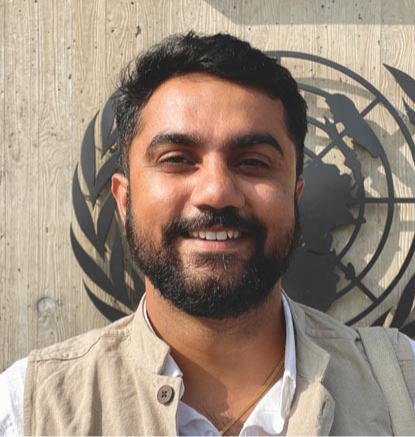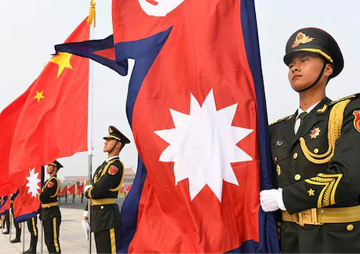
Over the last two decades, global health issues and international peace and security have been progressively linked; health has been framed and interpreted as an issue of security. However, the securitisation of global health has yet to lead to better health outcomes for the most marginalised in the Global South. Rather than strengthening health system capacities in the Global South, the health security strategies of global governance institutions and developed nations have largely focused on surveillance and monitoring of infectious disease outbreaks spread from the Global South to the Global North. This article argues that the securitisation of health does not necessarily translate to the security of health and that global governance institutions should adopt a rights-based approach in addressing health challenges, prioritising people and their health over the security interests of a select few.
The securitisation of health has been driven by a narrow Westphalian approach of protecting nation-states from external threats.
The World Health Organisation (WHO) defines global health security as “the activities required, both proactive and reactive, to minimise the danger and impact of acute public health events that endangers people’s health across geographical regions and international boundaries”. The securitisation of health has been driven by a narrow
Westphalian approach of protecting nation-states from external threats. While the idea of global health security has been widely invoked; however, its definition continues to
lack universal consensus as the concept remains centric on national security and defence rather than people and overall community health.
Securitisation of health
In the early 1990s, Barry Buzan, Ole Wæver and Jaap de Wilde, of what is now referred to as the Copenhagen school of thought, propounded that powerful actors perform securitising ‘speech acts’ to purposefully cast certain issues as posing existential threats to justify extraordinary measures. Once securitised, these subjects often receive immediate and priority action without legal and democratic constraints.
Historical developments have triggered and contributed to the successive securitisation of health over the past few decades. First, in 1994, the United Nations Development Programme (UNDP) introduced the idea of human security in its
Human Development Report and outlined health security as a key crosscutting element of other indicators of human development. Then, in 2000, with the emergence of infectious diseases, most notably the HIV/AIDS pandemic of the 1980s-90s, the developed countries persuaded the United Nations Security Council (UNSC) to convene a special meeting—also the first on health—on the HIV/AIDS pandemic. The UNSC, in its
Resolution 1308 stressed that infectious diseases, like HIV/AIDS, can threaten peace and security.
The United Nations Development Programme (UNDP) introduced the idea of human security in its Human Development Report and outlined health security as a key crosscutting element of other indicators of human development.
The UNDP report emphasised the necessity to promote health security for human development, and the UNSC’s resolution acknowledged the necessity of categorising infectious diseases on the global security agenda—this marked a turning point in global health politics. The Copenhagen school of thought provided the theoretical framework within which the powerful actors securitised a specific issue through the ‘speech acts’. In the years that followed, the importance of health has grown in global political forums, and the concept of ‘health security’ has become a critical part of development discourse, global governance, and foreign policies.
Global health security and WHO
Formally, the securitisation of health was mainstreamed into global health directives in 2005 after the WHO revised the
International Health Regulations (IHR). The amendment empowered the WHO Secretary-General to declare a Public Health Emergency of International Concern (PHEIC) if it satisfies that “an extraordinary event which is determined …. (1) to constitute a public health risk to other States through the international spread of disease and (2) to potentially require a coordinated international response”. Accordingly, between 2009-2020, the WHO declared six PHEICs—Influenza A in 2009, poliomyelitis in 2014, Ebola West Africa in 2014, Zika in 2016, Ebola DRC 2019, and COVID-19 in 2020.
The WHO promotes the security framework, as envisaged by the global north, as it boosts the WHO’s
capacities and capabilities to develop and implement its monitoring, preparedness and management programmes. Even a few months before the COVID-19 pandemic outbreak, the WHO proposed the
Health Systems for Health Security framework to boost the IHR and promote health security by complementing existing international
monitoring and surveillance measures. However, scholars have argued that rather than strengthening health system capacities in developing countries, security-driven systems focus on surveillance and monitoring of infectious disease outbreaks
to prevent spilling-over from developing to developed countries.
Even a few months before the COVID-19 pandemic outbreak, the WHO proposed the Health Systems for Health Security framework to boost the IHR and promote health security by complementing existing international monitoring and surveillance measures.
The substitution of WHO’s disease-oriented policy with a security-oriented policy obfuscates health response vis-à-vis access to medicines and overshadows critical discussions on social, economic, political, and other non-medical
determinants of health. For example, the IHR legally requires member states to maintain certain
monitoring and surveillance capabilities to report on infectious outbreaks. However, the WHO does not provide additional financial support for the same purpose. With limited funding, the states in the Global South, in many cases,
prioritise international compliance and underperform in strengthening their public health systems. Whereas the Global North continues to benefit from the health monitoring and surveillance data received from the Global South. The medicines, drugs, and vaccines developed using data from the Global South are patented in the Global North by the pharmaceuticals of the Global North and marketed at high prices across the world.
Global health security and the UNSC
The UNSC has successively contributed to the securitisation framing of health. Since 2000, the UNSC has been taking up global health issues on its international
peace and security agenda and, so far, passed six resolutions addressing three infectious diseases, namely – HIV/AIDS (
RES 1308;
RES 1983), Ebola (
RES 2177 West Africa;
RES 2439 DRC) and COVID-19 (
RES 2532;
RES 2565), and passed three resolutions addressing the protection of medical and humanitarian personnel and civilian’s hospitals in conflict areas (
RES 1998;
RES 2286; and
RES 2467).
A closer
study of these resolutions indicates that the Council has deliberated on health beyond the scope of epidemics and pandemics and established itself as an alternative forum to debate and negotiate global health issues. Nevertheless, while all PHEICs, as declared by WHO, are health emergencies, not all PHEICs have garnered the UNSC’s attention. There is no empirical criterion on how and when the UNSC elevate a public health issue to a threat to global security; rather, this decision rests on the political will of the permanent five (P5). Therefore,
Rushton’s question—“Security for whom? Security from what?”—continues to remain highly relevant and also unanswered.
A closer study of these resolutions indicates that the Council has deliberated on health beyond the scope of epidemics and pandemics and established itself as an alternative forum to debate and negotiate global health issues.
The UNSC views global health through a security lens, and its resolutions have more negative than positive impacts on global public health outcomes. While UNSC’s engagement in health emergencies has drawn global political attention to the need for cooperation and funding, it has been largely counterproductive, increased discord, compromised solidarity, and unified response.
The COVID-19 pandemic is the third infectious disease that has received UNSC’s attention. However, in the face of the global pandemic, the inherent
geopolitical rivalries and long-standing tensions between the P5 of the UNSC rendered it powerless. Despite securitisation framing, the UNSC fell short of presenting a befitting response to the pandemic. For example, the UNSC called for
solidarity and global cooperation on COVID-19 vaccines. However, most developed nations, including the P5, adopted the
nationalistic approach to COVID-19 vaccines and opposed a meaningful
TRIPS waiver.
Securitisation of the COVID-19 pandemic
On 11 March 2020, the
WHO declared COVID-19 as a pandemic. The pandemic has been securitised both by WHO and at UNSC through the ‘speech act’. The WHO Secretary-General
Tedros stated, “We are at war with a virus that threatens to tear us apart”, and the UNSC observed COVID-19 would unleash unprecedented effects on global peace and security. Governments across the world also turned to justifying a
security-oriented approach which allowed them to circumvent traditional procedures and legal requirements and justify draconian measures for controlling the infection. The critical question is—did framing COVID-19 as a security issue help in addressing the challenge effectively?
Failure of WHO’s COVAX initiative, adoption of watered-down TRIPS waiver, discriminatory measures like COVID-19 vaccine passport etc. contributed to a poor response to the COVID-19 pandemic.
The securitised framing of the COVID-19 pandemic generated global political and public attention; however, the global response to COVID-19 was
fragmented and ineffective. Failure of WHO’s COVAX initiative, adoption of watered-down TRIPS waiver, discriminatory measures like COVID-19 vaccine passport etc. contributed to a poor response to the COVID-19 pandemic.
The COVID-19 pandemic has accelerated the securitisation of health, with developed countries arguing for a wider acknowledgement, acceptance, and adherence to the health security approach in global health governance. For example, the European Union (EU) in the
proposed pandemic treaty is suggesting to include provisions on early detection, digital technology for data collection and sharing, pathogen and genomic data-sharing, and stronger health system and reporting mechanisms but persistent issues around data-benefit sharing, access to vaccines, medicines and technology remain underemphasised.
The COVID-19 pandemic has highlighted that surveillance, monitoring and data-sharing systems are not enough if developing countries continue to struggle to access vaccines, medicines and technology to address health issues. Therefore, global governance institutions and actors should adopt a rights-based paradigm that focuses on strengthening health systems and infrastructure for delivery and access to healthcare rather than securitised containment alone.
The views expressed above belong to the author(s). ORF research and analyses now available on Telegram! Click here to access our curated content — blogs, longforms and interviews.



 Over the last two decades, global health issues and international peace and security have been progressively linked; health has been framed and interpreted as an issue of security. However, the securitisation of global health has yet to lead to better health outcomes for the most marginalised in the Global South. Rather than strengthening health system capacities in the Global South, the health security strategies of global governance institutions and developed nations have largely focused on surveillance and monitoring of infectious disease outbreaks spread from the Global South to the Global North. This article argues that the securitisation of health does not necessarily translate to the security of health and that global governance institutions should adopt a rights-based approach in addressing health challenges, prioritising people and their health over the security interests of a select few.
Over the last two decades, global health issues and international peace and security have been progressively linked; health has been framed and interpreted as an issue of security. However, the securitisation of global health has yet to lead to better health outcomes for the most marginalised in the Global South. Rather than strengthening health system capacities in the Global South, the health security strategies of global governance institutions and developed nations have largely focused on surveillance and monitoring of infectious disease outbreaks spread from the Global South to the Global North. This article argues that the securitisation of health does not necessarily translate to the security of health and that global governance institutions should adopt a rights-based approach in addressing health challenges, prioritising people and their health over the security interests of a select few.
 PREV
PREV


